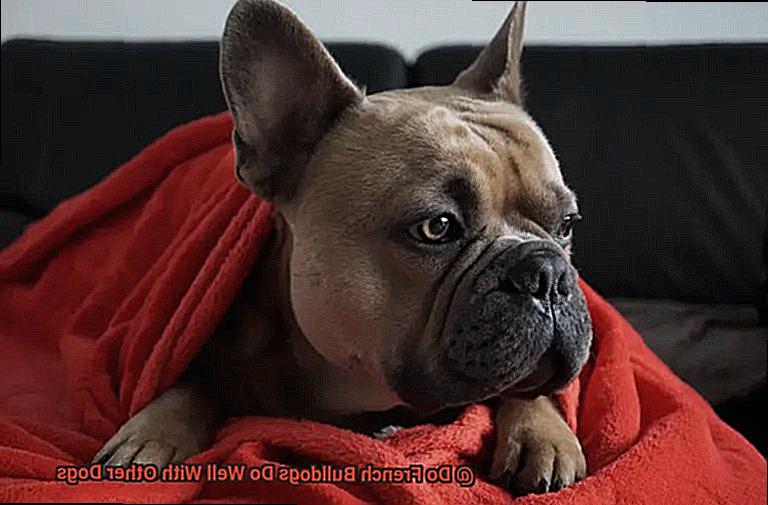Do French Bulldogs Do Well With Other Dogs?
Today, we’re tackling an intriguing question that every dog lover has pondered: “Do French Bulldogs do well with other dogs?” If you’ve ever been charmed by their squishy faces and playful personalities, you’re in for a treat.
French Bulldogs are adored pets all over the globe. But when it comes to their furry friends, do they play nice or keep to themselves?
In this post, we’ll dive into the fascinating world of French Bulldogs and their interactions with other dogs. Get ready for some insider knowledge, heartwarming tales, and a better understanding of this lovable breed’s social behavior.
Let’s sniff out the details together.
Do French Bulldogs do well with other dogs
Contents
- 1 Do French Bulldogs do well with other dogs
- 2 What Makes French Bulldogs Good Companions?
- 3 Factors to Consider When Introducing French Bulldogs to Other Dogs
- 4 The Benefits of Early Socialization for French Bulldogs
- 5 How to Choose the Right Playmate for a French Bulldog
- 6 Supervising Interactions Between French Bulldogs and Other Dogs
- 7 Training Tips for Teaching French Bulldogs Proper Behavior Around Other Dogs
- 8 Understanding Dominant or Territorial Behavior in French Bulldogs
- 9 Monitoring Interactions Between French Bulldogs and Other Dogs
- 10 Conclusion
However, if you’re considering adding a French Bulldog to your family, you may be wondering how well they get along with other dogs. In this article, we’ll explore the compatibility of French Bulldogs with other dogs, taking into account individual temperament and socialization experiences.
The Importance of Socialization:
Early socialization plays a crucial role in determining how well French Bulldogs will interact with other dogs throughout their lives. By exposing them to different dogs and environments from a young age, you can help them develop positive social skills and reduce the likelihood of behavioral issues in the future.
Individual Temperament Matters:
Just like humans, dogs have unique personalities. While French Bulldogs are generally friendly and sociable, there may be variations in their compatibility with other dogs based on individual temperament. Some French Bulldogs may be more dominant or territorial, which can affect their interactions with other dogs. It’s essential to assess your French Bulldog’s temperament and consider it when introducing them to new canine companions.
Gradual Introductions and Supervision:
When introducing a French Bulldog to another dog, it’s important to do so gradually and in a controlled environment. This allows them to acclimate to each other’s presence and establish positive associations. Furthermore, supervision is crucial during initial interactions or when unfamiliar situations arise to ensure the safety and comfort of both dogs.

Preference for Play Styles:
French Bulldogs tend to enjoy the company of dogs that have a similar energy level and play style. Taking this into consideration can enhance the chances of successful interactions between your French Bulldog and other dogs. If possible, observe your French Bulldog’s behaviors during playtime to identify their preferred companionship.
Training for Good Manners:
Training is essential for all dogs, including French Bulldogs, to develop good manners and appropriate behavior when interacting with other dogs. Use positive reinforcement techniques to encourage desired behavior and discourage any aggressive or territorial tendencies. A well-trained French Bulldog is more likely to have positive interactions with other dogs.
What Makes French Bulldogs Good Companions?

When it comes to finding a furry friend who can be both your loyal companion and get along with other dogs, look no further than the lovable French Bulldog. These adorable canines are known for their friendly and affectionate nature, making them excellent companions for both humans and fellow canines.
Friendly and Affectionate Nature
French Bulldogs have a natural inclination towards being friendly and affectionate. They love nothing more than showering their human counterparts with kisses and cuddles, making them the perfect companion for those who crave love and attention. Their gentle and easygoing temperament also allows them to form positive relationships with other dogs, as they are not typically aggressive or territorial.
Social Butterflies
French Bulldogs are social butterflies who thrive on interactions with both humans and fellow canines. Their playful nature makes them great playmates for other dogs, as they enjoy engaging in interactive games and activities. Whether it’s a game of fetch in the park or a playdate with other furry friends, French Bulldogs are always up for a good time.
Adaptability
One of the reasons French Bulldogs make such great companions is their adaptability. They can adjust well to different environments and social situations, including interactions with other dogs. This adaptability makes it easier for them to fit in with new canine friends and ensures that they can enjoy a harmonious relationship with their furry companions.
Proper Socialization is Key
It’s important to note that proper socialization from an early age is crucial in ensuring that French Bulldogs develop good social skills and are able to interact well with other dogs. Gradual introductions, positive experiences, and reinforcement when interacting with other dogs can further enhance their ability to get along well with them.
Individual Personalities
While French Bulldogs are generally known for being friendly and sociable, it’s essential to remember that individual personalities can vary. Some may be more outgoing and sociable than others. However, with patience, training, and a little bit of time, most French Bulldogs can learn to get along well with other dogs and become the best of friends.
Factors to Consider When Introducing French Bulldogs to Other Dogs
Introducing your French Bulldog to other dogs can be an exciting and rewarding experience, but it’s important to consider a variety of factors to ensure a smooth and successful introduction. By assessing temperaments, size and breed differences, socialization, neutral territory, supervision, positive reinforcement, gradual introductions, and seeking professional assistance if needed, you can help foster positive relationships between your French Bulldog and other dogs.
Assessing Temperaments:
Before introducing your French Bulldog to other dogs, it’s crucial to assess the temperament of both dogs. While French Bulldogs are generally friendly and affectionate, individual dogs may have different temperaments. Some may be more energetic or dominant, while others may be more laid-back or submissive. Matching temperaments can increase the likelihood of compatibility and reduce the risk of conflicts or aggression.
Size and Breed Differences:
French Bulldogs are small-sized dogs, so it’s important to consider the size and breed differences when introducing them to other dogs. Some larger or more energetic breeds may unintentionally harm or overwhelm a French Bulldog during playtime or interaction. It’s advisable to introduce them to dogs of similar size or gentle breeds that are known to be compatible with smaller dogs.
Socialization:
Proper socialization is key when introducing any dog to other dogs. French Bulldogs, like any other breed, need early and positive socialization experiences with other dogs to develop good behavior and communication skills. Gradually exposing them to different dogs in controlled environments can help build their confidence and reduce the likelihood of aggression or fear-based responses.

Neutral Territory:
Choosing a neutral territory for the introduction is beneficial for both dogs. This could be a neutral park or a friend’s backyard where neither dog has established dominance or territorial instincts. By starting in a neutral space, it allows for a more relaxed and balanced introduction.
Supervision:
Closely supervising the initial interactions between French Bulldogs and other dogs is crucial. Observing their body language, behavior, and reactions can provide valuable insights into their compatibility and help prevent any potential conflicts or negative experiences. Supervision also allows for quick intervention if any signs of aggression or discomfort arise.
Positive Reinforcement:
Using positive reinforcement techniques can greatly assist in the process of introducing French Bulldogs to other dogs. Rewarding both dogs for calm and friendly behavior can reinforce positive associations and create a pleasant experience for them. Treats, praise, and gentle petting can be effective ways to encourage desired behavior during the introduction process.
Gradual Introductions:

Introducing French Bulldogs to other dogs should be done gradually, allowing them to get acquainted at their own pace. Rushing the process or overwhelming them with too many new dogs at once can lead to stress, fear, or aggression. Start with short and controlled meetings, gradually increasing the duration and complexity of interactions as both dogs become more comfortable with each other.
The Benefits of Early Socialization for French Bulldogs
When it comes to raising a well-rounded and happy French Bulldog, early socialization is key. By exposing your pup to a variety of people, animals, and environments from a young age, you are setting them up for a lifetime of positive behaviors and interactions. Let’s take a closer look at the many benefits of early socialization for French Bulldogs.
Improved Social Skills
Early socialization teaches French Bulldogs how to communicate and interact appropriately with other dogs. This helps them develop positive behaviors and attitudes, reducing the likelihood of aggression or fear-based reactions. By learning how to read and respond to canine body language, they become more adept at navigating social situations, making them more enjoyable for everyone involved.
Prevention of Behavioral Issues
Proper socialization can also help prevent common behavioral issues in French Bulldogs. By exposing them to different situations, they become more adaptable and less likely to become overwhelmed or anxious in new environments. This can help reduce the risk of separation anxiety, excessive barking, and destructive behavior.
Enhanced Confidence and Well-being
Early socialization can have a profound impact on a French Bulldog’s confidence and overall well-being. By gradually introducing them to new experiences, they build resilience and self-assurance. This makes them more well-rounded and less prone to fear or aggression later in life.
Better Health Outcomes
Studies have shown that well-socialized dogs have lower stress levels, improved immune systems, and reduced risk of developing certain health issues. By providing your French Bulldog with positive social experiences, you are contributing to their overall health and longevity.
A Happier, Fulfilled Life
Socialization is not just about preventing behavioral problems; it also provides French Bulldogs with opportunities for play, exercise, and mental stimulation. These experiences contribute to a happier and more fulfilled life for your furry friend.
How to Choose the Right Playmate for a French Bulldog
French Bulldogs are known for their friendly and sociable nature, making them great companions for both humans and other dogs. However, when choosing a playmate for your French Bulldog, it is important to consider their temperament, energy level, size compatibility, age, and proper introduction techniques. By taking these factors into account, you can ensure a harmonious relationship between your French Bulldog and their playmate.
- Consider Temperament and Energy Level: French Bulldogs are generally calm and laid-back dogs, so it is best to choose a playmate with a similar disposition. Look for a dog that is friendly, easygoing, and enjoys socializing with other dogs. This will help prevent any potential conflicts or differences in play styles.
- Size Compatibility: French Bulldogs are small dogs, so it is important to select a playmate that is not too large or overpowering. Look for a dog of similar size or a smaller breed that can play safely without accidentally injuring your French Bulldog.
- Age Matters: Consider the age of the potential playmate. Puppies may have different energy levels and play styles compared to adult dogs. It is advisable to choose a playmate that is close in age to your French Bulldog to ensure they can engage in compatible play.
- Proper Introduction Techniques: Introducing your French Bulldog to potential playmates should be done gradually and under controlled circumstances. Start with neutral territory, such as a park or a fenced-off area, where both dogs can interact without feeling territorial. Observe their initial interactions carefully for any signs of aggression, fear, or discomfort from either dog.
- Equal Attention and Affection: It is essential to provide equal attention and affection to both your French Bulldog and their playmate. This will help prevent any feelings of jealousy or competition between the two dogs. Make sure they both receive quality time and individual attention from you.
- Supervise Playtime: Always supervise playtime between your French Bulldog and their playmate, even if they seem to get along well. Accidents can still happen, and being present allows you to intervene if necessary and ensure the safety of both dogs.
Supervising Interactions Between French Bulldogs and Other Dogs
French Bulldogs are known for their friendly and sociable nature, but it is important to supervise their interactions with other dogs to ensure their safety and well-being. In this blog post, we will explore the reasons why supervision is crucial, as well as provide tips and insights based on first-hand experience and credible sources.
Understanding Canine Body Language:
Dogs communicate primarily through body language, so being able to read and interpret their signals is essential in preventing conflicts. Signs of discomfort or aggression, such as raised hackles, growling, or stiff body posture, should be recognized and addressed promptly.
Gradual and Controlled Introductions:
Introducing French Bulldogs to other dogs should be done gradually and in controlled environments. Starting on neutral territory can help prevent territorial behavior. Using a leash during initial meetings provides better control and intervention if necessary.
Monitoring Behavior:
During the introduction process, it is important to monitor the dogs’ behavior closely. Signs of positive interaction include relaxed body language, wagging tails, and play bows. Signs of tension or aggression should be taken seriously and addressed immediately.
Consider Size and Energy Levels:
French Bulldogs are a small breed, so caution should be exercised when introducing them to larger or more energetic dogs. Matching energy levels can help create a more harmonious play environment and reduce the risk of accidents or injuries.

Prioritizing Socialization:
Regular socialization is crucial for French Bulldogs to develop good manners and positive behavior around other dogs. Exposing them to different dogs, environments, and situations from an early age helps build confidence and comfort in social settings.
Respecting Individual Preferences:
Not all dogs will get along, regardless of breed. Each dog has its own personality and preferences when it comes to socializing. Observing your French Bulldog’s individual comfort levels and preferences will help ensure their well-being.
Training Tips for Teaching French Bulldogs Proper Behavior Around Other Dogs
French Bulldogs are friendly and sociable dogs, but they can sometimes exhibit stubbornness and aggression towards other dogs. Training them to behave properly around other dogs is important for their well-being and the safety of everyone involved. In this article, we will explore the key training tips that can help you teach your French Bulldog proper behavior around other dogs.
Socialization: The Foundation of Good Behavior
Socialization is crucial for French Bulldogs to develop good manners and learn how to interact appropriately with other dogs. From an early age, expose your furry friend to various social situations, different breeds, sizes, and temperaments of dogs. This helps them become confident and polite in their interactions.
Positive Reinforcement: Rewarding Good Behavior
Use positive reinforcement techniques during training sessions. Reward your French Bulldog with treats, praise, or playtime when they display desired behaviors around other dogs. By associating positive experiences with being around other dogs, they will be encouraged to continue behaving well.
Consistency is Key
Consistency is vital when training French Bulldogs. Set clear boundaries and rules for their behavior and enforce them consistently. By doing so, your furry friend will understand what is expected of them and how to interact appropriately with other dogs.
Gradual Exposure
Start training in controlled environments with minimal distractions, such as a fenced yard or a quiet park. Gradually increase the level of difficulty by introducing more challenging environments with higher levels of distractions. This helps your French Bulldog generalize their training and behave appropriately in various situations.
Obedience Commands: Useful Tools
Teach your French Bulldog basic obedience commands like “sit,” “stay,” and “leave it.” These commands can be useful in redirecting their attention or managing their behavior around other dogs. For example, teaching them to “sit” and “stay” can help prevent unwanted jumping or lunging towards other dogs.
Seek Professional Help if Needed
If your French Bulldog shows signs of aggression or fear towards other dogs, it is important to seek professional help from a certified dog trainer or behaviorist. They can assess the situation and provide guidance on how to address any underlying issues.
Understanding Dominant or Territorial Behavior in French Bulldogs
French Bulldogs are beloved companions known for their friendly and sociable nature. However, they may also exhibit dominant or territorial behavior towards other dogs, which can lead to conflicts or aggression. In this article, we will delve into the causes of this behavior and provide tips on how owners can address it to ensure a harmonious coexistence with other dogs.
Causes of Dominant Behavior in French Bulldogs
Dominant behavior in French Bulldogs often stems from their innate desire to establish their position as the alpha or pack leader within a group of dogs. This behavior can manifest in various ways, such as growling, snapping, or physically challenging other dogs. Individual personalities and socialization experiences also play a significant role in determining whether a French Bulldog will display dominant behavior.
Causes of Territorial Behavior in French Bulldogs
Territorial behavior in French Bulldogs is typically directed towards protecting their personal space, belongings, or family members. When approached by other dogs, they may display aggressive posturing, barking, or lunging. This behavior is rooted in their natural instincts to defend what they perceive as their territory.
Addressing Dominant or Territorial Behavior
- Early Socialization and Training: Start socializing your French Bulldog from a young age by exposing them to various situations, people, and animals. This helps them learn appropriate behavior and reduces the likelihood of dominance or territoriality.
- Proper Introductions: When introducing your French Bulldog to other dogs, do so in a controlled and positive manner. Gradually increase the exposure and monitor their interactions closely. Reward calm and friendly behavior with treats and praise.
- Obedience Training: Teach your French Bulldog basic obedience commands like sit, stay, and leave it. These commands establish your role as the leader and help redirect their focus during potentially challenging situations.
- Consistency: Consistency is key in addressing dominant or territorial behavior. Set clear boundaries and rules for your French Bulldog, and enforce them consistently. This helps them understand what is expected of them and reduces confusion.
- Seek Professional Help: If you’re struggling to manage your French Bulldog’s dominant or territorial behavior, don’t hesitate to seek guidance from a professional dog trainer or behaviorist. They can provide personalized advice and strategies to address the specific needs of your dog.
Monitoring Interactions Between French Bulldogs and Other Dogs
As a French Bulldog owner, it is crucial to monitor your furry friend’s interactions with other dogs to ensure their safety and well-being. While French Bulldogs are generally social and friendly, there are a few reasons why monitoring their interactions is important.
Size Differences Can Pose Risks

French Bulldogs are small in size compared to some other dog breeds. This size difference can pose a risk during playtime, especially if the other dog is significantly larger or more energetic. Keeping an eye on their interactions can help prevent any accidental injuries or overwhelm.
Stubbornness and Dominance Behavior
French Bulldogs have a reputation for being a bit stubborn. They may also exhibit dominant behavior towards other dogs. While this behavior is not necessarily aggressive, it can lead to conflicts if not properly managed. By supervising their interactions and intervening when necessary, you can redirect their behavior and prevent any potential skirmishes.
Gradual Introductions and Controlled Environments
When introducing your French Bulldog to new dogs, it’s important to do so gradually and in a controlled environment. Start with short, supervised interactions and gradually increase the duration as the dogs become more comfortable with each other. This allows them to develop positive associations and build trust.
Observing Body Language
During interactions, it’s crucial to observe the body language of both your French Bulldog and the other dog. Signs of stress, fear, or aggression should be addressed immediately. Common signs to watch out for include growling, raised hackles, stiff body posture, and excessive barking. By paying attention to these cues, you can prevent any potential conflicts from escalating.
Seeking Professional Help if Needed
If you notice any persistent signs of aggression or discomfort during interactions, it may be necessary to separate the dogs and seek professional help from a dog trainer or behaviorist. They can provide guidance on how to address any issues and ensure a safe and positive environment for your French Bulldog.
Remembering Every Dog is Unique
It’s important to remember that every dog is unique, and their compatibility with other dogs may vary. Some French Bulldogs may thrive in multi-dog households or enjoy playing with other dogs, while others may prefer the company of humans or be more selective with their canine companions. Respect your French Bulldog’s preferences and tailor their interactions accordingly.
Regular Assessment and Creating a Safe Environment
Regularly assessing the dynamics between your French Bulldog and other dogs is crucial. This includes monitoring their behavior during walks, visits to the dog park, or encounters with other dogs in social settings. Additionally, creating a safe and peaceful environment for interactions is essential. Provide enough space, toys, and resources for each dog to prevent competition or conflicts over these items.
EvweYG93oF0″ >
Conclusion
French Bulldogs are known for their friendly and sociable nature, making them generally good with other dogs.
They thrive on companionship and enjoy the company of both humans and canines alike. However, it’s essential to introduce them properly and provide proper socialization from a young age to ensure positive interactions.
With the right training and guidance, French Bulldogs can form strong bonds with other dogs, leading to harmonious relationships in multi-dog households. It’s important to note that each dog is unique, and individual personalities may vary.
Some French Bulldogs may be more reserved or territorial, requiring careful introductions and ongoing supervision. Additionally, early experiences and past traumas can influence a dog’s behavior towards others.
Therefore, it’s crucial to assess each situation on a case-by-case basis and monitor interactions closely.




